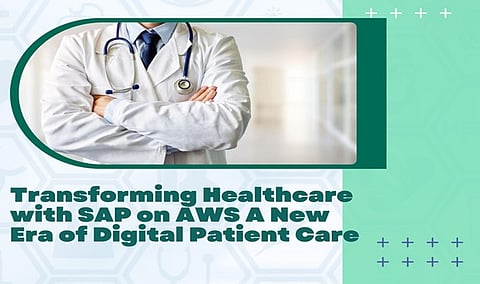

The healthcare industry is experiencing a digital revolution through the use of cloud computing for more effective patient care, operational efficiency, and streamlining of data management. Shamshuddin Shaik, a specialist in cloud-enabled healthcare solutions, investigates how SAP on AWS is transforming healthcare infrastructure. Through the integration of the cloud, hospitals achieve optimized clinical processes, provide security, and advanced analytics to facilitate improved decision-making. SAP on AWS delivers scalable and secure technology that enhances operating efficiency and insights from data.
Cloud-based migration of SAP systems has been a game-changer for healthcare institutions. With AWS infrastructure, hospitals are able to provide high availability, scalability, and cost savings. Cloud migration allows healthcare facilities to manage rising volumes of data without sacrificing system performance. Dynamically allocating resources through cloud flexibility minimizes latency and enhances delivery of patient care. In addition, moving to the cloud enables healthcare organizations to decrease their dependency on hardware servers, which translates to reduced maintenance costs and increased system reliability and up-time.
Healthcare organizations produce enormous amounts of data every day, ranging from patient records to diagnostic imaging. SAP on AWS offers real-time processing of data, which minimizes data retrieval times and improves coordination among medical practitioners. By consolidating patient data, healthcare professionals can enhance the accuracy of treatment, automate administrative tasks, and maintain regulatory compliance. Real-time access to patient information also facilitates quicker and more informed clinical decision-making. AI-powered analytics provide greater insights into patient trends, enabling healthcare professionals to evaluate risk factors and create customized treatment plans.
As cyber attacks and stringent healthcare regulations become increasingly prevalent, security and compliance are paramount for healthcare organizations. SAP on AWS provides multi-layered security solutions, such as encryption, access controls, and automated compliance tracking. These security components ensure patient data is secure while adhering to industry regulations. Deploying AI-based security solutions improves threat detection, which helps to mitigate the risks involved with data breaches. Machine learning-based proactive threat monitoring systems constantly scrutinize network activity for anomalies to respond more quickly to potential security breaches.
Machine learning and artificial intelligence are revolutionizing healthcare through predictive analytics and automation. AI models based on SAP support hospitals in predicting patient needs, maximizing resource utilization, and detecting possible health hazards. Predictive analytics optimizes treatment planning by examining past history, enhancing the detection of disease at an early stage, and tailoring patient care. Automation powered by AI also simplifies administrative processes, minimizing the amount of manual effort and improving business efficiency. Using AI-powered clinical decision support systems, clinicians are able to tap into smart suggestions, minimizing diagnosis errors and increasing medical accuracy.
With the integration of SAP and AWS, clinical workflows have been highly improved. Cloud-based technology facilitates easy interdepartmental coordination, lessens waiting time, and optimizes patient experience. Real-time analytics enable medical professionals to track patient conditions, make proactive changes to treatment plans, and optimize hospital management. Patient engagement platforms like AI-based chatbots and mobile apps also enhance patient and healthcare provider interaction. Personalized health monitoring platforms enable patients to receive timely medication and follow-up appointment reminders, enhancing treatment plan adherence.
The Internet of Things (IoT) is revolutionizing healthcare today by facilitating remote monitoring and real-time tracking of medical equipment. SAP on AWS combines IoT solutions that enable healthcare providers to gather data from wearable devices, hospital equipment, and remote patient monitoring systems. This integration boosts proactive healthcare management through ongoing insights into patient health, fewer hospital readmissions, and timely interventions. Predictive maintenance powered by IoT for medical equipment also minimizes equipment breakdowns, providing for continuous patient care.
The future of healthcare technology will remain influenced by the progress in AI, blockchain, and edge computing. Blockchain technology will be used to improve data integrity and protect electronic health records, and edge computing will lower latency for real-time patient monitoring. With increased cloud adoption, healthcare organizations will be prioritizing how they can leverage smart automation, expand telehealth services, and enhance overall patient outcomes by using data-driven innovations. Digital twin technology based on AI and cloud computing will enable healthcare professionals to develop real-time virtual replicas of patients' health.
In conclusion, the integration of SAP on AWS is transforming healthcare by optimizing data management, enhancing security, and improving patient care. With cloud computing, hospitals can achieve greater efficiency, scalability, and compliance while leveraging AI and IoT for real-time insights. As digital transformation accelerates, healthcare institutions must embrace cloud-based solutions to improve care delivery, streamline operations, and ensure data security. Shamshuddin Shaik’s insights highlight the impact of cloud technology in modern healthcare, ensuring a future where digital transformation enhances medical care and operational excellence.
